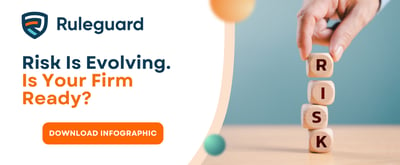Author: Richard Rivett - GRC Solutions Consultant
Topics: Risk, Compliance, Governance, Technology, Culture
Regions and Regulators: Global, Europe, UK
The Role of GRC - Why Value is Not Found in Headcount Reduction
Making the Case for Investment in Risk and Compliance Technology
In 1907, the RMS Lusitania was hailed as an engineering marvel. But behind the glamour, shipping lines like Cunard understood that true value was not about flashy headlines or squeezing every penny - it was about confidence, reliability, and long-term preparedness. Businesses today can learn the same lesson when it comes to Governance, Risk and Compliance (GRC).
But headcount reduction is not where the real return on investment lies (Risk Modernisation [sic]; Cut costs, not quality. KPMG). While GRC is a standing item on most board agendas, it’s often framed narrowly - as a regulatory necessity rather than a strategic enabler. This perception can lead to underinvestment and the wrong question: ‘Can we manage compliance with fewer people?’. But headcount reduction is not where the real return on investment lies.
The real ROI is strategic enablement: the ability to create capacity, scale, respond to rising regulatory demands, and operate with confidence - without introducing operational risk. In this sense, GRC is less about cutting costs and more about giving your organisation the ability to thrive even as the world grows more complex.
Reframing ROI for Leadership
Boards and budget holders will naturally ask, “What do we get for this spend?”. If the answer is only “compliance coverage” or “audit readiness,” the conversation stalls. Instead, GRC investment should be positioned as the engine of operational efficiency and resilience. By automating routine tasks like control attestations, incident tracking, and evidence collection, teams free up their time for strategic oversight. Centralising information removes bottlenecks and keeps the organisation nimble, even under pressure.
Modern platforms also give early warning when risks emerge, turning potential crises into manageable issues. They do not just help organisations avoid breaches or fines; they give leadership the confidence to act decisively. When audit season arrives, evidence retrieval is instant, and teams are not pulled away from core responsibilities to chase documentation.
Most importantly, as regulations multiply and business units expand, a well-structured GRC system allows the organisation to scale oversight without inflating headcount. That is leverage, not cost-cutting.
Making the Case with Stories and Metrics
Boards are already engaged with GRC - but abstract discussions can dilute its strategic relevance. Meaningful stories and clear metrics help elevate the conversation. Instead of drowning them in compliance jargon, you need to speak their language. Show them how modern GRC reduces audit preparation hours, shortens the time it takes to escalate incidents, and cuts the frequency of regulatory breaches.
Narratives stick even better than numbers. Imagine explaining: “Last year, we detected a pattern of failed controls in a vendor before it became a breach. That insight - surfaced by our GRC system - saved us from regulatory review and reputational harm”. Or: “By centralising evidence, we cut audit prep time by nearly half, freeing the compliance team to focus on higher-value analysis.” These examples turn GRC from a line item into a strategic asset.
Sometimes, the most compelling argument is to show the cost of doing nothing. Legacy tools like Excel and Outlook may seem convenient, but they create versioning errors, slow responses, and leave no reliable audit trail. Vendor-dependent platforms can rack up hidden costs and trap organisations in inflexible workflows. Ask leadership, “What would a failed regulatory review cost us?” or “How much time do we lose chasing evidence every quarter?”
Beyond Spreadsheets and Email Chains
Spreadsheets and email may feel familiar, even comfortable - they’re tools that teams have relied on for years. But as regulatory demands grow and organisational complexity increases, these tools begin to show their limitations. They struggle to support the scale, consistency, and reliability required for modern GRC operations. Versioning errors, fragmented communication, and manual evidence tracking can slow response times and introduce unnecessary risk.
Dedicated GRC platforms, by contrast, offer a more robust, auditable foundation. They consolidate information, standardise workflows, and provide real-time visibility across departments. It’s the difference between patching a leaky pipe with duct tape and installing a professionally engineered plumbing system. One might hold temporarily, but the other is built to last - supporting growth, resilience, and confidence in decision-making.
Overcoming Common Objections
When boards hesitate, it is rare because they do not see GRC’s importance. It is usually about concerns over complexity, adoption, or unclear ROI. Address those worries directly. Choose intuitive platforms that reflect real workflows, which makes adoption far smoother than expected. Emphasise that GRC is not just another system to maintain; it’s foundational infrastructure, as critical as plumbing or electrical wiring. And remind decision-makers that sticking with outdated tools does not save money, it introduces risk and creates costly disruptions during audits.
A Business Case That Resonates
The strongest business cases do not just focus on compliance. They tie GRC investment to the organisation’s bigger ambitions: resilience, trust, and market reputation. Show how automation and centralisation save time, how initiative-taking risk management avoids fines and reputational damage, and how scalable systems let you grow oversight without growing teams. Link GRC investment to strategic initiatives like ESG, digital transformation, or market expansion to show its role as a true enabler, not a cost centre.
Final Thought: ROI Beyond the Balance Sheet
A modern GRC system is not simply a tool. It is a foundation for confident decision-making. Its return is not measured by shrinking your team but by expanding your organisation’s agility and resilience. The benefits include smoother audits, fewer disruptions, reduced hidden costs, and the ability to respond swiftly to risk without scrambling for resources.

Unlock Effortless Compliance!
Book a tailored discovery call to see how Ruleguard can help your firm save time, minimise risk, and stay audit-ready with confidence.
About the Author














.png?width=400&height=166&name=Compliance%20Monitoring%20White%20Paper%20(1).png)
































.jpg?width=1000&height=749&name=shutterstock_2450801853%20(1).jpg)


